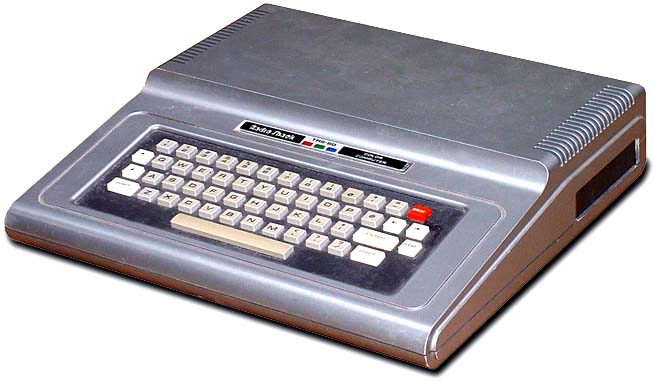
I had just purchased a Radio Shack Color Computer , pictured above, for over $500 and hooked it up to a portable TV to begin my computer experience. I had to pay the additional $200 to get 32K memory on the hard drive from the standard 16K memory. You had to program any software you wanted to run on this computer and save the program to a tape recorder tape. Portability was still a long way off. I happened to hear about a vendor in a local office building that was selling a "portable" computer called an Osborne.
The Osborne, shown above, folded up like a suitcase and was about 24 pounds with 64K hard drive, a small 5 inch green screen and sold for just under $2,000. I went over to look at it out of curiosity with no real intent to spend that much money on a computer. Little did we realize that someday we could carry a computer with us in our pocket with a smart phone.
Fast forward to 2014 and we now see how far portability in computing has come with Google Glass and this week with the Apple IWatch. The old idea from Dick Tracy of a wrist watch for just talking is so out of date with our digital world. So how do you use something so small? At what point does making something smaller make it too difficult to use with your hand and fingers.The Google Glass operates with a voice command system and the IWatch tries to address this issue through innovative design. What we are probably looking at is a move away from interfacing with computer technology that was invented during the time of desktop computing. The smaller products will continue to interface with the users in ways that will create new ways to access and interface with the hardware. This transition is not dissimilar to when we transitioned from sitting down at a desk to use a computer to carrying our computer in our pocket. Ultimately the success of the IWatch might depend on what apps are created with the IWatch in mind that makes the IWatch a useful tool to process. Look for all types of exercise apps developed for the IWatch. I wouldn't be surprised to see runners and other athletes to use the IWatch in place of the existing cardio rate monitors. Remember when the IPhone was launched no one really knew that apps were going to be what made this a product everyone wanted. Making phone calls is only the third most use of the IPhone after apps and texting.
Possibly the most far reaching new innovation to come out with the new IWatch is the IPay system that Apple has developed. For right now the information on your purchases made with IPay can be sold to marketers and open a new revenue source for Apple similar to what has powered Google's revenue. But a future revenue source may even be more profitable. Companies that send you a monthly bills have been looking at how they can get you to use technology to give you the opportunity to charge your purchases on their billing systems. They would like to take the credit card business away from the banks. Verizon has looked at the use of smart phones to make our purchases which would show up on our Verizon bills. This would allow them to charge interest on bills not paid in full. Interest on unpaid bills is where the money is. Is IPay just another way for Apple to get into the business of making money on charging interest? It is not hard to image a time in the not too distant future for the end of the credit card business as we know it now. The credit card business has too much potential profit for other businesses not to look at how new technology gives them an opportunity to tap into some of this profit. This would be a real game changer for banks who have long relied on interest on credit cards to be a huge profit center. I don't feel sorry for the future of banks as they seem very capable of coming up with new profit centers. The only real threat for banks that I see is to the bank buildings as banking is moving to being online businesses. Going into a bank and interacting with a real person is something that may go the way of the old bank passbook.
P.S.
Ken Burns and PBS have teamed up again for a documentary. The Roosevelts starts this weekend. TV worth watching.
P.S.1
As a coincidence next week I start a free online course on the Constitution that is being taught by Teddy Roosevelt's great, great grandson. I may blog on this in the future.
#hocotech



1 comment:
Glass and the iWatch are two different things with different purposes. It's better to compare the Android Wear (Google's watches which have been out for a while) and the iWatch.
Post a Comment